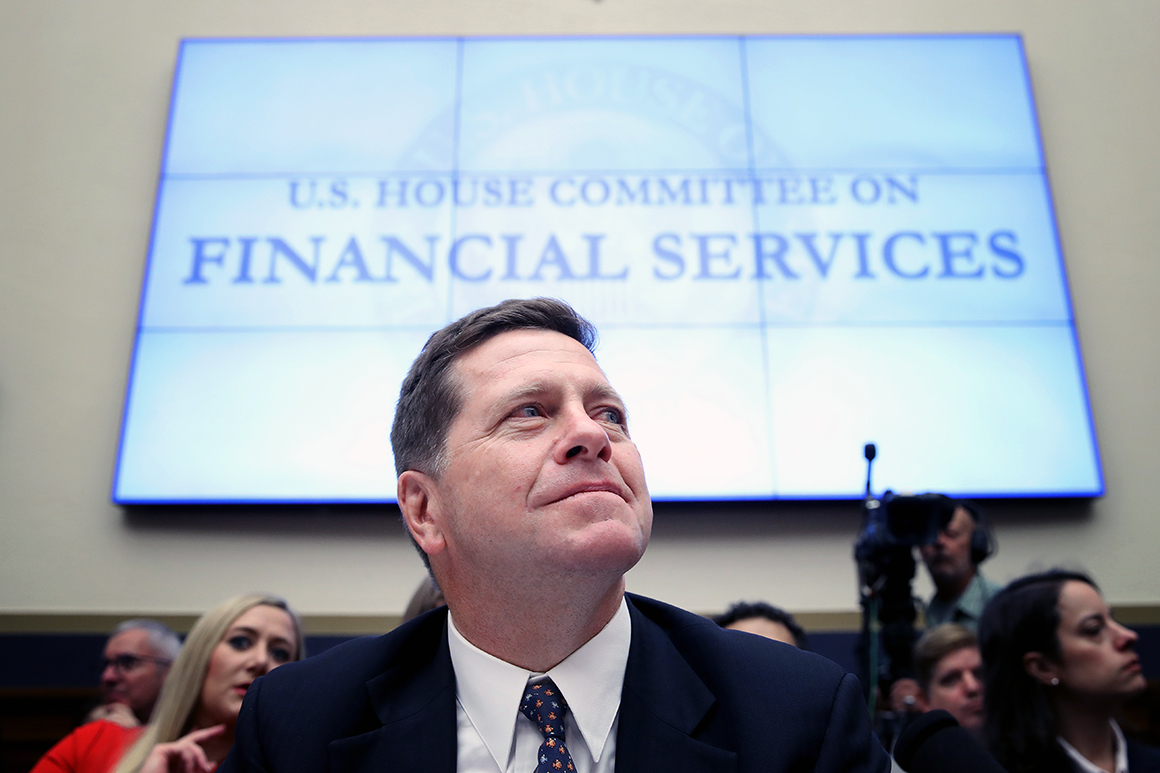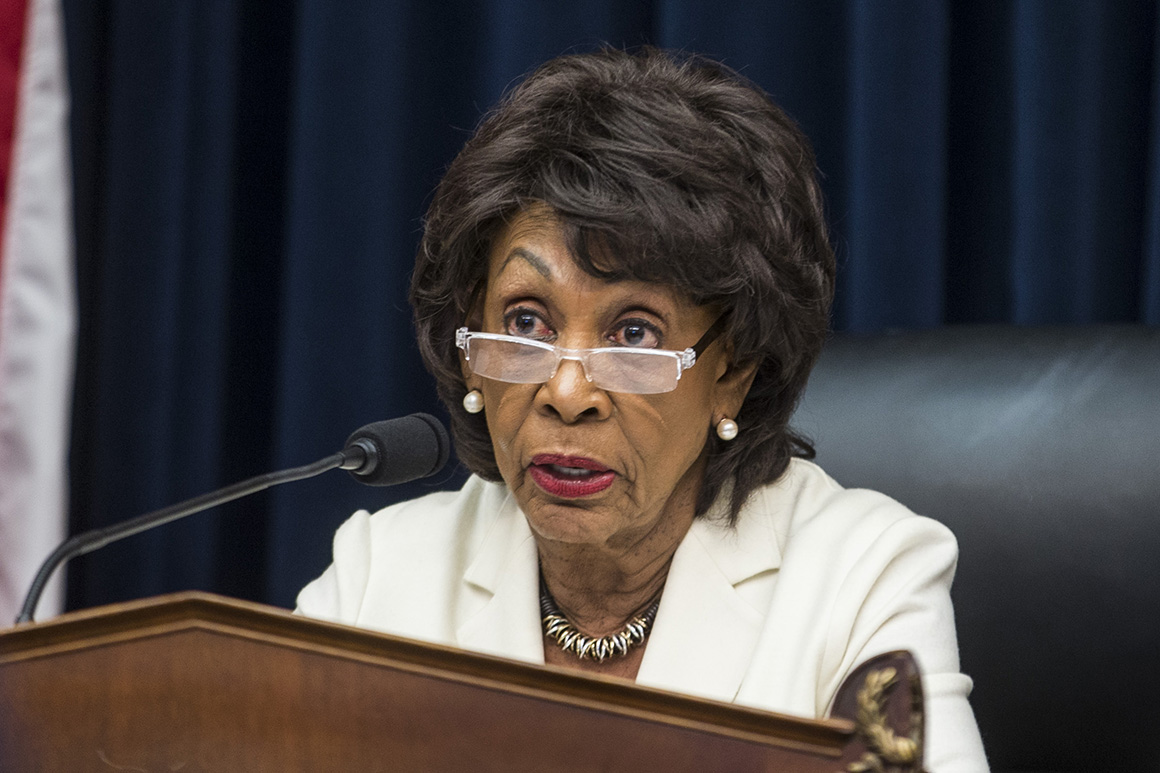
Jay Clayton is having a weird week.
At 8:30 p.m. Friday, he was just a powerful but low-profile financial regulator, whose splashiest work as chairman of the Securities and Exchange Commission was his war on Bitcoin. Then the email went out.
Shortly after 9 p.m. that evening, Attorney General Bill Barr made two announcements in one fateful missive: Geoffrey Berman, the powerful U.S. attorney for the Southern District of New York, was stepping down from his job, effective immediately. And President Donald Trump would nominate Clayton to take his place. In the meantime, the U.S. attorney for New Jersey would step in.
There was just one hiccup: Berman hadn’t actually resigned.
Make that two hiccups: He was overseeing a host of investigations that touched on denizens of Trump world, including a reported probe into Trump’s personal lawyer Rudy Giuliani and criminal cases against two key players in Trump’s impeachment saga. Berman’s ouster immediately fueled concerns about the future of those probes.
The episode kicked off a mind-bending 24 hours for people in and near the Justice Department. And it didn’t help that the president, the attorney general and Berman himself all offered conflicting explanations of what exactly was going on and who was in charge of arguably the most powerful team of prosecutors in the country. In the days since then, Berman has stepped down but little clarity has emerged.
That could change on Thursday, as Clayton is scheduled to testify before the House Financial Services Committee, where Democrats will demand answers and rip his impending nomination over his lack of prosecutorial experience and the murky circumstances of his appointment.
Spokespersons for the SEC didn’t respond to multiple queries for on-record confirmation of whether or not Clayton will show up for the hearing. Committee staff, meanwhile, have indicated they believe he will still turn up for the routine oversight hearing, which was scheduled weeks before America’s top securities regulator found himself in the middle of a DOJ cold war. Justice Department officials, meanwhile, are keeping a close eye on the hearing.
Rep. Gregory Meeks (D-N.Y.), a member of the committee, said he wants to hear Clayton’s perspective on the circumstances surrounding his nomination, which he said “smells like some kind of political gamesmanship through the president.”
“I think the American people have a right to know. Whether he answers the questions or not, I don’t know,” Meeks said.

Clayton will be the first participant in l’affaire Barr/Berman to publicly field questions under oath. The top interlocutor will be the committee’s Democratic chair, Maxine Waters, who is never hesitant to grill Trump administration officials before the panel. But she held off weighing in publicly as the drama unfolded last weekend.
The biggest question might be this: Why was Barr in such a hurry to oust Berman? A Justice Department official told POLITICO that Berman had been ousted because Clayton said he wanted the job, and that was that. Berman could have stayed on, however, until Clayton made his way through the Senate confirmation process for the post. But instead of following that typical track, Barr pushed Berman out immediately and announced on Friday night that Craig Carpenito — the head of the New Jersey U.S. Attorney’s Office — would take his spot, only to reverse himself less than 24 hours later.
A person close to Carpenito told POLITICO that he didn’t learn Barr wanted him to take over that role until Friday afternoon — suggesting the decision was made in a hurry. And a person close to Clayton said the SEC commissioner has telegraphed for months that he was interested in leading the Southern District. On top of that, it would be an immensely taxing new role for a prosecutor already handling two high-stakes jobs; Barr tapped Carpenito earlier this year to run the department’s task force responding to coronavirus-related hoarding and price-gouging, a complex nationwide effort. Adding in the Southern District job on top of that would have placed an extraordinary new demand on Carpenito.
And on top of that, subbing in Carpenito for Berman wouldn’t have been normal or necessary. The standard department practice is for a U.S. attorney’s top deputy (usually titled first assistant) to step in if the top role in the office becomes vacant. But the Carpenito move wouldn’t have been the first time Justice Department headquarters broke with that practice. Earlier this year, Barr installed a lawyer from his office as temporary U.S. attorney for the District of Columbia after the person holding the job — Jessie Liu — moved on. After stepping in, Shea later signed off on an unprecedented move to overrule career prosecutors in that office and recommend a shorter sentence for former Trump consigliere Roger Stone.
In a Saturday morning all-hands call with employees from the New Jersey office, Carpenito said he agreed to take the position only because he’d been told Berman was departing voluntarily, according to people familiar with the call who described it to POLITICO. And he said he hadn’t been asked to shut down any of the office’s sensitive cases. Had someone asked him to, he said, he would have refused.
But within a few hours, that all was moot. By midafternoon on Saturday, Barr said Berman’s chief deputy, Audrey Strauss, would run the office until Clayton’s confirmation. Berman’s Friday night firing had spawned a host of theories — with widely varying levels of plausibility — on why Barr might have wanted him out: Maybe to end an investigation into Trump’s lawyer, Rudy Giuliani! Maybe to protect associates of Jeffrey Epstein, the dead pedophile whom Berman’s office had investigated! Maybe to undo a sealed indictment against President Donald Trump himself!
Strauss’ Saturday-afternoon installation put those theories to bed. Public records show she is a registered Democrat who has donated to Joe Biden and Hillary Clinton. More importantly, she worked as a career prosecutor in the district many years ago and also served on the independent counsel’s investigation into the Iran-Contra affair. She returned to government work out of retirement at Berman’s request, and has a reputation for being even-handed and fair-minded. If Barr had cooked up Berman’s ouster as a sinister plot to install a pliable political ally in Manhattan, the effort had been a total disaster.
So the question nagged: Why had Barr fired Berman? No news account has provided a satisfying answer yet, and the attorney general isn’t talking — though his team announced on Wednesday that Barr will testify before the House Judiciary Committee next month.
“In some ways, the craziest part is that Barr does not feel the need to justify the firing of Berman, and the Republican senators don’t ask,” one career DOJ lawyer told POLITICO. “A very low day for the Justice Department.”
Others worried about Clayton’s appointment, given that he has never worked as a prosecutor, let alone that he would be walking into one of the Justice Department’s most challenging assignments after what the famously independent team in Manhattan likely sees as an attempted hostile takeover.
“It’s nearly impossible to impanel grand juries or trial juries, it’s really hard to interview witnesses, compassionate release rulings are letting convicted felons out of jail, etc.,” said another department attorney. “This is the worst possible time for an inexperienced U.S. attorney.”
“Barr’s view that Clayton would be qualified shows Barr’s utter disregard for competent criminal prosecution,” the lawyer added.
Clayton’s allies, meanwhile, are dismayed to see him pulled into a toxic political vortex. They point out that many senior DOJ officials — including Barr’s second-in-command, Jeffrey Rosen, and the current head of the Criminal Division at headquarters — don’t have prosecutorial experience, either. And they argue that Clayton’s management of a complex and high-stakes enforcement docket at the SEC, paired with extensive corporate law experience as a partner at Sullivan & Cromwell, a well-known Wall Street firm, has prepared him well for the role. With a tenure at the SEC that’s been broadly popular among Republicans, some lament that his nomination might otherwise have sailed through the GOP-controlled Senate. But because Barr chose to anchor his appointment to Berman’s firing, they fear the controversy may damage his reputation and endanger his confirmation. Sen. Lindsey Graham, the Republican chairman of the Senate Judiciary Committee, said he will honor what’s known as the blue slip process by deferring to New York’s senators on whether or not to let Clayton’s nomination proceed. Both senators have called for Clayton to bow out.

It’s a dynamic that will be on display during Thursday’s hearing.
Members’ questions and discussion are widely expected to veer off from the original topic set in late May, which is how the coronavirus has affected capital-raising and emergency lending.
Committee members of both parties said they expect Democrats to hammer Clayton at the hearing for his connection to Berman’s firing. Republicans, meanwhile, intend to focus on barriers to capital-raising, according to a committee aide.
But even administration intrigue can be trumped by the economy. When Clayton appears Thursday, it will mark the first time the SEC chairman has spoken publicly before Congress since virus fears triggered an epic stock market meltdown in March. (Spokespersons for the SEC didn’t respond to multiple queries for on-record confirmation of whether or not Clayton would show up for the hearing, doing so only late Wednesday evening after this article was published for subscribers.)
That means lawmakers face political pressure to discuss the issue as the pandemic continues to wreak economic havoc on their constituents, with bankruptcies on the rise, businesses shut down and local governments struggling to pass budgets with tax revenues having fallen off a cliff.
Rep. Bill Huizenga (R-Mich.) said he’s reassured by conversations with Democratic committee leaders that the policy-focused premise of the meeting remains, even though leaders can’t control member questions.
“I’m not planning on dwelling on that, or really focusing on that because he is still chair of the Securities and Exchange Commission,” Huizenga said of the SDNY nomination. “The idea of the hearing was to find out what’s happening in capital markets and what’s happening with our economy writ large.”
Source: politico.com
See more here: news365.stream






